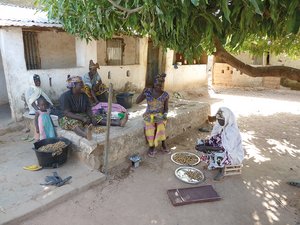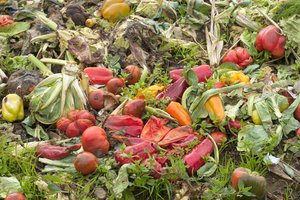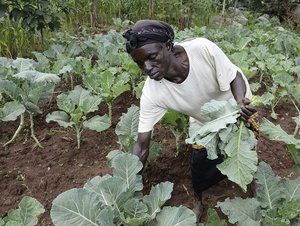Food security and nutrition

Against the background of a growing world population, finite natural resources and numerous threats such as climate change and political conflict, securing world food supplies remains the challenge that the international community of states faces.
- The right to adequate food on the global agenda – a 30-year review(2024)
- Agrifood prices and international trade flows (2023)
- Food price inflation, its causes and speculation risks (2023)
- AMIS – enhancing food market transparency and policy coordination(2023)
- Agricultural prices and food security – a complex relationship(2023)
- Strengthening the market linkages of smallholders in the face of global supply shocks(2023)
- Long-term fertilisation strategies for blended agricultural sustainability are needed(2023)
- Corporate power is growing in the industrial food chain(2023)
- Global fertiliser price volatility – approaches to reduce vulnerability among countries in the Global South (2023)
- The African Continental Free Trade Area – can the milestone live up to its promise?(2023)
- Tapping intra-regional agricultural trade potentials in West Africa(2023)
- Markets for farmers and consumers, not for speculators and corporations(2023)
- Food security corridors – a promising solution to conservation and resource-grabbing conflicts(2023)
- The worldwide food crisis is taking a dramatic turn for the worse (2022)
- Food security is more than production volumes and high yields(2022)
- Diversity is the fundamental principle to use(2022)
- Is conflict-hit Kashmir heading for food crisis? (2021)
- Towards a world without hunger: research points the way(2021)
- Once again, Africa is used as a justification to push for bad legislative change in Europe(2019)
- Cereal banks in The Gambia – a case study(2015)
- The impact of Ebola on food security in West Africa(2015)
- A conflict-sensitive approach is needed(2013)
- Skyfarming: Staple food for growing cities!?(2012)
- Strategies to feed the nine billion mouths(2012)
Food loss and waste

Roughly one third of the food produced globally for human consumption is lost or wasted – 1.3 billion tons per year. Even if these estimates are subject to numerous uncertainties, one thing is beyond doubt: every kilogramme of food that is produced but not consumed is one too many. For it embodies valuable, wasted resources such as land, water, agricultural inputs and energy, unnecessary CO2 emissions have been released into the atmosphere, farmers have lost not only income but also a valuable part of their nutrition, and consumers pay the increased prices that result. Our authors analyse the dimensions of these losses and the underlying complex web of causes and show how approaches have to be designed against the background of global challenges such as climate change and food security.
- Addressing post-harvest challenges in aquatic food systems (2024)
- SDG Target 12.3 – where are the stumbling blocks?(2023)
- Measuring food loss and waste – instruments, challenges and global perspectives(2023)
- Why we need to go beyond technology(2023)
- Motivation factors for food waste reduction(2023)
- Unleashing the power of innovation(2023)
- Bridging the cooling gap through digitalisation (2023)
- "If we only rely on safe bets, we will miss out on big opportunities"(2023)
- Metal silo, beyond minimising food losses – Ethiopian experience(2023)
- Transforming by-products into resources – circular economy approaches for agricultural products(2023)
- Turning cocoa waste into a high-quality product for confectionery(2023)
- From innovation to upscaling – circular economy in the rural-urban nexus (2023)
- From waste to wealth – biomass solutions (not only) for India’s food loss challenge(2023)
- Simple technology, big impact(2015)
- Tackling food losses: New approaches needed(2013)
- Who does what in post-harvest loss reduction?(2013)
- Post-harvest agriculture in a changing climate(2013)
- How losses in maize and manioc value chains impact on the environment(2013)
- Tackling post-harvest cereal losses in sub-Saharan Africa(2013)
- Better income through improved milk hygiene standards(2013)
- Handling fresh vegetable produce from urban gardens(2013)
- Technical know-how is only one side of the coin(2013)
- New developments in stored product protection(2013)
- No chance for aflatoxins(2013)
Nutrition

In its 2019 publication Food in the Anthropocene, the EAT-Lancet Commission described the link between nutritional targets and environmental sustainability. In brief, the study argues that diets and food production will need to change in order to improve health and avoid damage to the planet, emphasising that people will have to eat more fruit, vegetables, nuts and seeds, legumes and whole grains while reducing the consumption of ruminant meat in particular. Setting out from this, the authors presented a proposition for a global reference diet. Whereas it is undisputed that the recommendations of the Lancet Commission point in the right direction, the question remains how the world population can be urged to take precisely this course.
- Food security is more than production volumes and high yields(2022)
- Diversity is the fundamental principle to use(2022)
- Changing times, changing diets(2020)
- Healthy diets – a privilege of the rich?(2020)
- Towards sustainable diets and planetary health: lessons from early research and knowledge gaps(2020)
- Tackling the double burden of malnutrition(2020)
- "Reducing malnutrition levels calls for concerted efforts"(2020)
- Civil society’s engagement for better nutrition – the case of Namibia(2020)
- Helping ‘local favourites’ join the race for healthier diets(2020)
- Insects for dinner?(2020)
- Small fish with a big potential(2020)
- The trend towards healthy diets – an opportunity for farmers and agri-entrepreneurs(2020)
- Nutrition and health: farming women in Kenya’s Murang’a speak out(2020)
- How ‘supermarketisation’ affects nutrition and health in Kenya(2019)
- How agriculture can boost nutrition(2016)
- A Little Nutrition Glossary(2016)
- What should seed systems look like?(2016)
- Market access and farm household dietary diversity(2016)
- Gendered pathways to better nutrition(2016)
- “We must highlight the pluses of pulses”(2016)
- Seizing the opportunity(2016)
- “All measures must bring tangible benefits for smallholder farmers”(2016)
- Walking the talk in nutrition-sensitive agriculture(2016)
- Combining efforts to end hunger and malnutrition - The SUN Movement(2016)
- Completing the revolution through biofortification(2016)
- Fitter and healthier with traditional varieties(2015)
- Sprouts and microgreens for a nutritious diet(2013)



